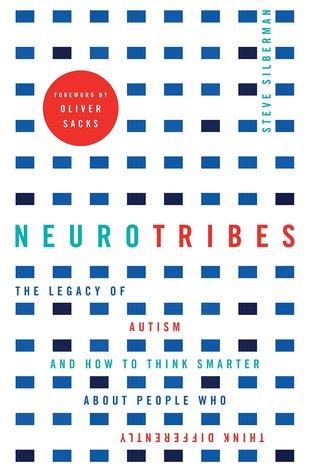Adventures in Bookland: NeuroTribes by Steve Silberman

As the father of two autistic boys, I’ve read more than my fair share of the burgeoning field of autistic books so it’s a pleasure to find a new departure in reading on the subject. Up until now, most books on autism have fallen into one of three categories:
- the inspiring parental story of recovering a child from the depths of autistic disengagement via some new and unlikely therapy often involving animals and/or shamans;
- the inspiring autistic autobiography, telling how an autistic person overcame discrimination and misunderstanding to achieve personal autonomy and a good life;
- the how-to guide for parents with autistic children.
Now Steve Silberman has added a third category: the history of autism as a medically recognised condition, from the physicians who first spotted it and struggled, more or less successfully, to describe, through the various therapies tried to cure/treat/ameliorate/accommodate it, to the split between different autistic ‘camps’ and schools, to about where we are now: a condition that has gone from almost nothing to almost everyday within two generations.
As a history, it’s generally excellent, although a little marred by Silberman’s tendency to paint people as ‘good guys’ (Hans Asperger – the Austrian physician who first recognised the condition and pioneered a notably gentle and appreciative treatment) and ‘bad guys’ (Leo Kanner – Austrian-American psychiatrist who popularised a restrictive view of autism in America whom Silberger basically accuses of stealing Asperger’s work). The reality seems greyer and harder to define, particularly in light of recent evidence that Asperger fell into the morally grey areas of a doctor working under the Nazi regime: he seems to have sent at least two of his children to the Spiegelgrund clinic knowing that they would likely be euthanised there, while managing to protect most of the children under his care.
The history of autism thus becomes entwined with the history of the century and the changing nature of medical theorising: from restrictive diagnoses that sought to exclude those who were borderline to diagnoses that now tend to bring far more children within a diagnostic framework. What is clear, is that autism is a spectrum, with many of its traits being potentially highly useful.
I do sometimes wonder, as a parent, whether the insight that drove the MMR anxiety that linked the vaccine to the increase in levels of autism might have other sources. It’s quite common for parents of autistic children to think they are developing normally and then, at an early age but usually somewhere between one and three, for there to be a sudden falling off in the child’s development: the first of many subsequent meltdowns. I remember that with the eldest of my two autistic sons. In his case, the decline coincided with his starting at school. Now autism is a developmental disorder and I wonder if one possible factor in its increase is the earlier and earlier ages at which we are putting children into school. For any child, and particularly for boys, the sudden move from the predictable and stable environment of home, dealing mainly with parents and siblings, into the far less predictable environment of school where volatile peers are the main source of interaction might cause a social-system overload leading to a massive withdrawal from social and linguistic learning as the child tries desperately to accommodate and cope with the sudden huge increase in stimuli, both physical and sensory. If there’s any truth in this idea, then countries where children begin school later should have lower rates of autism. It would be interesting to see if this bears out.
In the meantime, read Silberman’s book if you want to know how autism, as a medically recognised condition with a wide and often competing range of therapies, arrived at its present stage. For all our difficulties today, it’s still a huge improvement over the days of ‘refrigerator mothers’ when much of the medical profession basically blamed the parents for the child’s condition or some of the frankly horrible ‘cures’ devised by the Behaviourist. It also serves as a useful reminder that the real expert is one who understands that he still has much to learn about a subject.
0 Comments